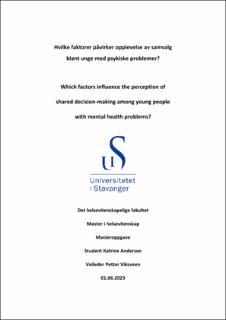| dc.contributor.advisor | Viksveen, Petter | |
| dc.contributor.author | Andersen, Katrine | |
| dc.date.accessioned | 2023-09-01T15:51:34Z | |
| dc.date.available | 2023-09-01T15:51:34Z | |
| dc.date.issued | 2023 | |
| dc.identifier | no.uis:inspera:149179372:2644380 | |
| dc.identifier.uri | https://hdl.handle.net/11250/3087098 | |
| dc.description.abstract | Det er lite kunnskap om brukermedvirkning og samvalg knyttet til ungdoms bruk av psykiske helsetjenester. Formålet med denne studien var å bidra til økt innsikt i ungdoms erfaringer med samvalg og hjelp fra helsetjenesten når de opplevde psykiske problemer. Studien ble gjennomført ved bruk av en tverrsnittstudie. Resultatene viste at de fleste ungdommene ønsket å få være involvert i egen behandling, for eksempel ved å få bestemme hva behandler kunne si til foresatte. Ungdommene opplevde å bli inkludert i avgjørelser som ble tatt, og var fornøyd med hva de fikk bestemme. De viktigste prediktorene for samvalg var om ungdommene opplevde å få hjelp fra helsetjenesten, og om de fikk starte behandling når de trengte det. Involvering gjennom samvalg er i tråd med nivået “partnerskap” som tilsvarer “borger kontroll” i Arnsteins “stige for medvirkning”. Ungdommene får makt til å delta i avgjørelser vedrørende eget liv gjennom aktiv medvirkning og samvalg. Mange av ungdommene visste ikke hvor de kunne få hjelp når de opplevde psykiske problemer. Selv om over halvparten rapporterte å få hjelp var det også en betydelig andel som ikke opplevde utbytte av tjenestene de mottok. Pårørendes og venners meninger om psykiske problemer og behandling var av stor betydning for ungdommene. Resultatene av studien kan brukes som et bidrag for å forbedre tjenestene slik at de bedre møter ungdommenes behov.
Nøkkelord: unge, ungdom, psykiske problemer, samvalg, psykiske lidelser, brukermedvirkning | |
| dc.description.abstract | Little is known about user involvement and co-choice related to adolescents' use of mental health services. The purpose of this study was to contribute to increased insight into adolescents' experiences of shared choice and help from the health services when they experienced mental health problems. The study was conducted using a cross-sectional study. The results showed that most of the adolescents wanted to be involved in their own treatment, for example by deciding what the therapist could say to their parents/guardians. The young people felt that they were included in the decisions that were made, and were satisfied with what they were allowed to decide. The most important predictors of shared choice were whether the adolescents felt that they received help from the health services, and whether they were allowed to start treatment when they needed it. Involvement through co-election is in line with the level of "partnership" which corresponds to "citizen control" in Arnstein's "ladder of participation". Young people are empowered to participate in decisions concerning their own lives through active participation and co-choice. Many of the young people did not know where to get help when they experienced mental health problems. Although more than half reported receiving help, a significant proportion did not experience any benefit from the services they received. Family members' and friends' opinions about mental health problems and treatment were of great importance to the adolescents. The results of the study can be used as a contribution to improve services so that they better meet the needs of young people.
Keywords: youth, youth, mental health problems, shared choice, mental disorders, user involvement | |
| dc.language | nob | |
| dc.publisher | uis | |
| dc.title | Hvilke faktorer påvirker opplevelse av samvalg
blant unge med psykiske problemer? | |
| dc.type | Master thesis | |
